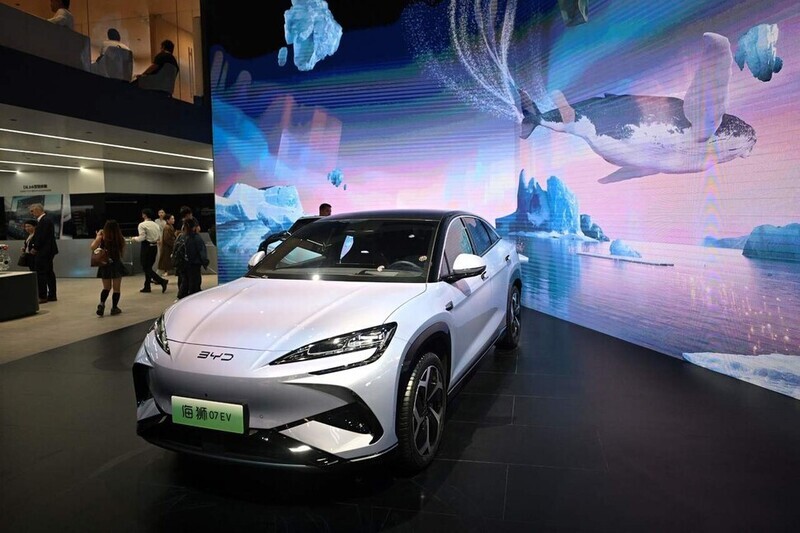hankyoreh
Links to other country sites 다른 나라 사이트 링크
[Correspondent’s column] China-Europe relations tested once more by EV war


By Choi Hyun-june, Beijing correspondent
In the 2010s, Europe stood on the sidelines of the US and China’s struggle for hegemony. Europe has generally sided with the US in its conflict with China while retaining economic and cultural exchange with China. For its part, China has been annoyed about Europe taking America’s side, but it couldn’t afford to make an enemy of Europe amid its grueling struggle with the US.
Russia’s invasion of Ukraine in 2022 was the first test of China-Europe relations. There was a collision between Europe’s interest in halting Russia and China’s interest in carrying Russia forward. China has provided Russia with economic support, but refrained from any blatant military support. That’s the compromise China has found in a situation where it can’t completely satisfy either Europe or Russia.
The second major test of China-Europe relations has to do with electric vehicles. This dispute may be a tougher nut to crack because it concerns a key area of the economy that the two sides have never wrestled over before.
China’s automotive industry has long been considered third-rate because success in the industry has conventionally required decades of technology and experience. But the advent of the era of electric vehicles has changed the rules of the game.
Given its lightweight vehicles and digital advantages, China has rapidly become a leader in the electric vehicle industry while emerging as a major player in the automotive industry as a whole. Last year, 2 out of every 3 electric vehicles sold around the world were manufactured in China. Propelled by the growth of electric vehicles, China edged aside Japan to become the world’s number one automobile exporter.
Europe, as the home of several global automakers, is highly dependent on the automobile industry. So when Chinese electric vehicles began to flood in like a tsunami, Europeans began to feel a sense of crisis. Last year, 20% of electric vehicles sold in Europe were of Chinese make, with the share projected to increase to 25% this year. Chinese-made electric vehicles are making inroads in the European market, which has aggressively adopted electric vehicles as a response to climate change.
Last October, the EU launched an investigation into what it regards as unfair subsidies for Chinese-made electric vehicles, with the US quickly following suit. Eight months later, on June 12, the EU reached a tentative decision to impose tariffs of up to 48.1% on Chinese electric vehicles. While the US also decided to impose 100% tariffs on Chinese EVs last month, that wasn’t as momentous as the EU’s decision because hardly any Chinese electric vehicles are imported to the US.
Since China has focused national resources on the electric vehicle industry, regarding it as a driver for future growth, China is unlikely to back away with its tail between its legs. China totally rejects the EU’s claims about overcapacity and unfair subsidies and is exploring potential retaliatory measures.
China has announced additional tariffs on medium-size and large gas-using cars, a category where European companies like Mercedes-Benz and BMW have an advantage, and is also looking into raising tariffs on European pork, dairy products and cognac. China’s response is tailored to hit major European countries — including Germany, Spain, Denmark and France — where it hurts.
This dispute may not be as straightforward as the US and China’s ongoing rivalry over semiconductors. In the semiconductor dispute, the US, as the undisputed leader in the field, is trying to crush a still-nascent China. But in the electric vehicle dispute, Europe is basically making a belated counterattack against China, which has already gained a comparative advantage.
A serious challenge for Europe is the fact that major European automakers such as Mercedes-Benz and BMW rely on the Chinese market for around one-third of their total sales. In the long term, shutting out Chinese electric vehicles might work to their advantage, but that would mean writing off a large chunk of their sales for the time being.
Please direct questions or comments to [english@hani.co.kr]

Editorial・opinion
![[Column] The miscalculations that started the Korean War mustn’t be repeated [Column] The miscalculations that started the Korean War mustn’t be repeated](https://flexible.img.hani.co.kr/flexible/normal/500/300/imgdb/original/2024/0630/9717197068967684.jpg) [Column] The miscalculations that started the Korean War mustn’t be repeated
[Column] The miscalculations that started the Korean War mustn’t be repeated![[Correspondent’s column] China-Europe relations tested once more by EV war [Correspondent’s column] China-Europe relations tested once more by EV war](https://flexible.img.hani.co.kr/flexible/normal/500/300/imgdb/original/2024/0628/7617195640940814.jpg) [Correspondent’s column] China-Europe relations tested once more by EV war
[Correspondent’s column] China-Europe relations tested once more by EV war- [Correspondent’s column] Who really created the new ‘axis of evil’?
- [Editorial] Exploiting foreign domestic workers won’t solve Korea’s birth rate problem
- [Column] Kim and Putin’s new world order
- [Editorial] Workplace hazards can be prevented — why weren’t they this time?
- [Editorial] Seoul failed to use diplomacy with Moscow — now it’s resorting to threats
- [Column] Balloons, drones, wiretapping… Yongsan’s got it all!
- [Editorial] It’s time for us all to rethink our approach to North Korea
- [Column] Why empty gestures matter more than ever
Most viewed articles
- 1[Column] The miscalculations that started the Korean War mustn’t be repeated
- 2Yoon echoed conspiracy theories about Itaewon disaster, former National Assembly speaker says
- 3Dreams of a better life brought them to Korea — then a tragic fire tore them apart
- 4Blaze at lithium battery plant in Korea leaves over 20 dead
- 5[Correspondent’s column] Who really created the new ‘axis of evil’?
- 6[Correspondent’s column] China-Europe relations tested once more by EV war
- 7[Editorial] Seoul failed to use diplomacy with Moscow — now it’s resorting to threats
- 8[Editorial] Exploiting foreign domestic workers won’t solve Korea’s birth rate problem
- 9CIA record confirms US ‘completely destroyed’ Seoul’s Haebangchon in 1950 bombardment
- 10Moscow tells Seoul to rethink ‘confrontational course’